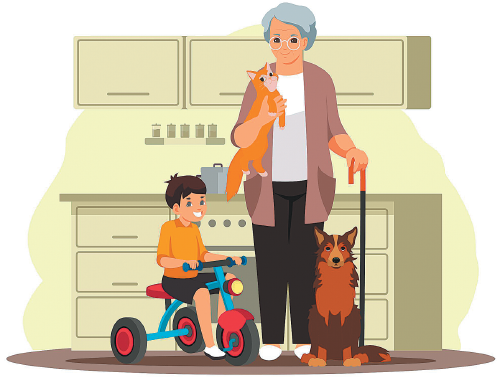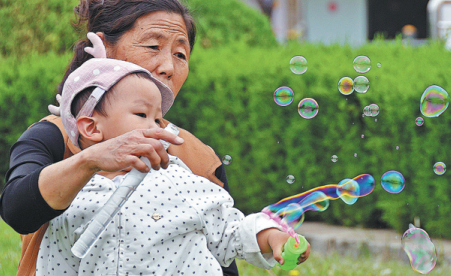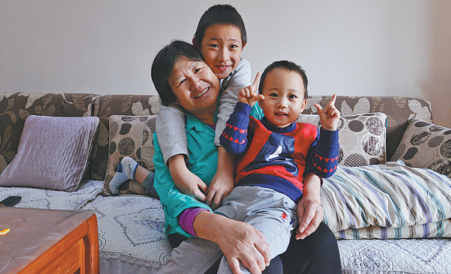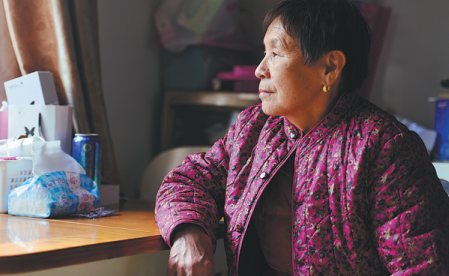Family matters
The issue that can turn home life into heaven or hell

On a quiet afternoon, relaxed and spreading herself across a commodious sofa, Wang Meiying, 62, who has two grandchildren, is absorbed in her cellphone, thumbing through her contacts on the social media app WeChat as her baby grandson lies sound asleep in a pram in a bedroom. For Wang, engaging with her friends through WeChat offers a short respite in a day in which she is otherwise busy taking care of the baby.
She has made a New Year doll the screensaver on her cellphone. The image of a chubby baby is god, symbolizing good luck, longevity and fertility. She, her daughter, son-in-law and two grandchildren are crammed into a 62-square meter apartment in downtown Beijing.
In China, being preoccupied with a large, thriving family is the normal state of affairs-or at least that is how Wang sees things. Her daughter and son-in-law are the products of one-child families, a result of the national family planning policy that was in force for about 40 years until 2016. It was a change Wang and the grandmother on her daughter's husband's side quietly welcomed, allowing them to support the idea of having a second grandchild, and the young couple finally decided in 2019 to go ahead with the birth. That child is now 18 months old.
"I'm obviously aware that my daughter went through a lot to have the second child," Wang says. "To ensure she's happy I try to free her up from the daily hassles of child care, and I do my best to avoid conflicts caused by the different ways we look at parenting."
In communities, parks and shopping malls across China, grandparents pushing prams is a common sight. The National Health Commission says the country has nearly 18 million senior migrants-those who leave their hometown to live in another locality-accounting for 7.2 percent of the country's 247 million migrants, and 43 percent of them say they migrated with the sole purpose of taking care of the younger generations.
The second-child policy is now playing out in full, with many families having embarked on that road. It has given some old people the time of their lives, but for others it has proved to be sheer hell.
With a sharp cry, Liu Meiling's heart tightens, and she rushes to 18-month-old Erbao (second pearl) lying on the ground crying as Dabao (first pearl), 5, remains quiet. This, Liu says, is a frequent scene in the family. The girl makes her young brother cry, and intense conflict often seems to be in the offing. Liu says her mother-in-law pushes her aside and picks up the boy and castigates her daughter.
"You're very nasty," she tells the girl, according to Liu. "Treat your brother that way and you're going to kill him."
The cowering girl's face is red, and she is bawling.
"Mom, how can you say that about a child?" Liu says.
She reaches out to take Erbao from her mother-in-law, who refuses to let him go. As this is going on both children scream in fright, Liu says.
Over the next few days Liu and her mother-in-law do not talk to one another, and the atmosphere is fraught. Liu blames her mother-in-law for being careless with the children and accuses her of being biased in favor of boys. The mother-in-law, angry, wipes tears from her eyes and eventually storms out, threatening to return to her hometown.
She later tells her son's wife: "I was tied up at your home all the time. I looked after the big one and the small one. I was so tired my back never stopped aching, and then I have to put up with all your complaining."
This account of Liu is likely to be familiar to many of China's elderly. With the advent of the second-child policy, happy days of retirement for old people seem to be farther away than ever.
Instead, under the burden of familial responsibility and the high risk of bringing up a baby for a prolonged period, old people seem to have become more powerless, overwhelmed with feelings of hopelessness.
"Taking care of children is a heavy responsibility, especially if the physical health of the aged minder is in decline," says Wu Jie, deputy dean of the Institute of Psychology and Behavior of Tianjin Normal University and director of the Tianjin Student Mental Health Development Center.
"They feel more and more powerless and tend to take on excessive psychological burdens, which may lead to emotional disorders."
Wu has long been concerned about the mental wellbeing and inter-generational upbringing problems of the elderly. The emotional and psychological problems of some elderly people largely derives from the anxiety in bringing up a baby, he says.
"With the second-child policy, the number of elderly people with various emotional disorders has really been increasing.
"The anxiety and other negative emotions of the elderly can easily be passed on to the children and other family members. This inevitably leads to tensions in the family's interpersonal relationships, especially conflict between mothers-in-law and daughters-in-law."
Unlike with young people, the emotional disorders of the elderly are often manifested in various physical discomforts, and some will feel tightness in the chest, palpitations, stomachache, feeling bloated and other symptoms, which are often related to mood swings, Wu says.
Often when elderly people report not feeling well, a physical examination finds no organic cause, because at the root of it is a psychological problem, Wu says.
Zhang Xiulian, 68, says she has been feeling down lately, whereas she always used to be talkative and loved to laugh. Her daughter-in-law in Beijing, who has one child, was recently expecting a second, and plans were made by her and the father to ask Zhang to take care of the baby in Beijing.
Zhang says she lacks the physical strength compared with five years ago when she helped raise the couple's first child. She was also hesitant about leaving her husband behind in Hebei province and wanted to pay for her son to recruit a nanny in Beijing. But the son said that in Beijing a 24-hour-a-day nanny costs too much, and after to-ing and fro-ing the daughter eventually had an abortion.
As a result, Zhang says, she and her husband are full of guilt.
"I blame myself for dragging down the whole family," she says.
Wu says: "The root cause of these phenomena is the low level of social services. The most basic social service resources, such as housekeeping services, the nanny market and nursing home services, have not been normalized and standardized, giving people a sufficient sense of dependability. When every family makes various plans it can only rely on itself and the people closest to it. Once a link fails to hold, it becomes passive.
"Public services ... are not good enough to help individuals keep things in balance."
In a report by the Shaanxi Provincial Statistics Bureau on people's willingness to have a second child, published last April, nearly 60 percent of families surveyed said they had no plans to have a second child. More than 66 percent said the financial cost of raising children was too great, and 46 percent said this was because of a lack of childcare resources.
Among the reasons given by those who said they were willing to have a second child was "the fear of a child being lonely".
"A harmonious family relationship is very important for children's education, which requires everyone to fully respect and communicate with each other," Wu says.
"The personalities, abilities and health status of the elderly vary greatly. Young parents should fully consider how their elders will be able to cope in every way and pay more attention to their needs."
Young parents need to take care of educating family members, Wu says.
"Older people can provide help according to their own abilities, but it must be made clear that it is primarily parents who are responsible for educating their children."




Today's Top News
- Iconic hall reopens after decade-long renovation
- High-speed rail reaches 50,000 km milestone
- China puts sanctions on US defense firms, execs
- Sanctions show China's resolve to safeguard its sovereignty and territorial integrity
- China OKs three action plans to build pilot zones for a Beautiful China
- CPC leadership meeting stresses steadfast implementation of eight-point decision on improving conduct






























